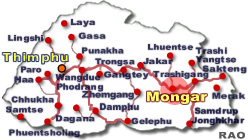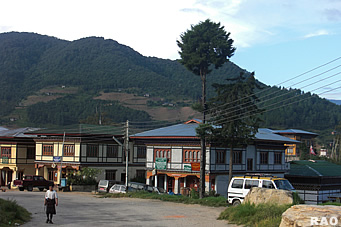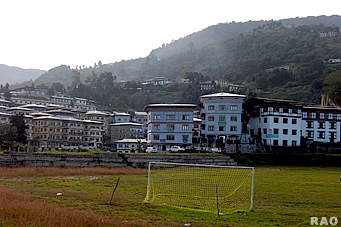 |
Bhutan Economy: Hydroelectric Power |
|
 |
Bhutan
Information |
|
|
 |
|
Kurichhu
project: Unprecedented development for Mongar dzongkhag
|
 |
Mongar
should tap the huge power resource from the Kurichu hydroelectric project
to launch industrial undertakings and usher their dzongkhag into an era
of unprecedented economic boom and prosperity.
 |
| Addressing the gups, chimis,
dzongkhag officials and members of the DYT and GYTs in Mongar dzongkhag
at the Eighth Plan review, His Majesty the King said that industrialization
was the key to developmental success and called upon the dzongkhag's 422-member
Tshongpa community to start building industrial enterprises which will
create jobs, generate revenues, increase the income of the people in all
the 16 geogs of the dzongkhag and, in the process, spur the economic growth
of the whole country. |
|
Establishing
industries and manufacturing as many products as possible for export would
also improve trade balance with neighbouring India. "The government's objectives
in developing the hydropower in the country is to supply electricity to
all the towns and villages in Bhutan and to improve the quality of life
of the people in the rural sector," His Majesty said.
 |
Mongar
| Plenty
of power will be made available throughout eastern Bhutan with the commissioning
of the Kurichu project. Three generators at the project will be commissioned
this year and the fourth next year to generate about 400 million units
of power a year, sufficient even to export to India. To draw and distribute
Kurichu power in Mongar dzongkhag, the government was spending Nu 214.8
million, excluding Nu 86.4 million allocated to supply power to 828 households
in the villages and towns of Mongar in the Eighth Plan. |
|
His Majesty
said that the present cost of the project had reached Nu 5685 million and
the actual cost could exceed Nu 6.00 billion after completion.
Sixty
percent of the cost of the project had been given as grant and 40 percent
as loan at an interest of 10.75 percent by the government of India. The
Kurichu hydro-electric project, which is about to be completed, will supply
abundant power to the whole of eastern Bhutan His Majesty added that the
people of Bhutan were grateful for the 60 percent grant the government
of India had given to construct the Kurichu project.
"When we signed the
agreement papers the government of India was concerned that the project
was economically not viable," His Majesty said.
"Nevertheless due to the
close friendship between India and Bhutan they decided to provide the assistance."
Explaining the government's plans to distribute power in Mongar dzongkhag,
the power director said that 828 households, rather than 400 households
as initially planned, would be supplied with power in the Eighth Plan.Transmission
lines were being drawn from Gyelposhing to the Kilikhar substation, 80
percent of which has been completed under a non-plan budget of Nu 128 million.
 |
Mongar
The
power distribution from the sub-station is scheduled to begin sometime
in July and, by the end of the Ninth Plan, most of the villages and all
the towns in the dzongkhag will be electrified.
"Mongar dzongkhag
will be the first to receive power from Kurichhu," the director said, adding
that the project had been started on the initiative of His Majesty the
King to alleviate the kidus of the people in the eastern dzongkhags. |
|
The
director explained that the cost for bringing power to each household in
the dzongkhag would come to Nu 100,000 while the power supply for the rural
population will be heavily subsidised and the tariff will never repay the
cost.
The
Mongar Tshongpa chimi, Namgala, said that the Tshongpas of Mongar have
gained the confidence to tap the business prospects that would be created
by the Kurichu project after listening to His Majesty the King. "We'll
establish industries big, small and medium, according to our capacities,
and do our best to fulfill the vision shared with us today by His Majesty
the King." Former official Dasho Tsheten Dorji said that the Mongar Tshongpas
were not able to specify the industrial enterprises they could take up
without feasibility studies but were, nonetheless, discussing the idea
among themselves. "There was no electricity anywhere in the dzongkhag when
I was young," he said, commenting on the transformation brought by development
in Mongar. "Now the night has literally turned into day."
| Contributed
by Samten Wangchuk, Kuensel, Bhutan's national newspaper |
 |
|
more
information
|

|
|





